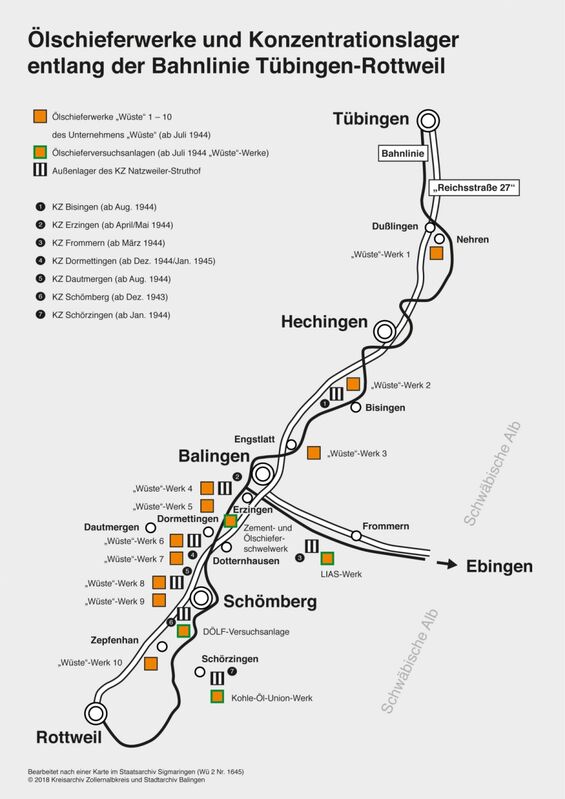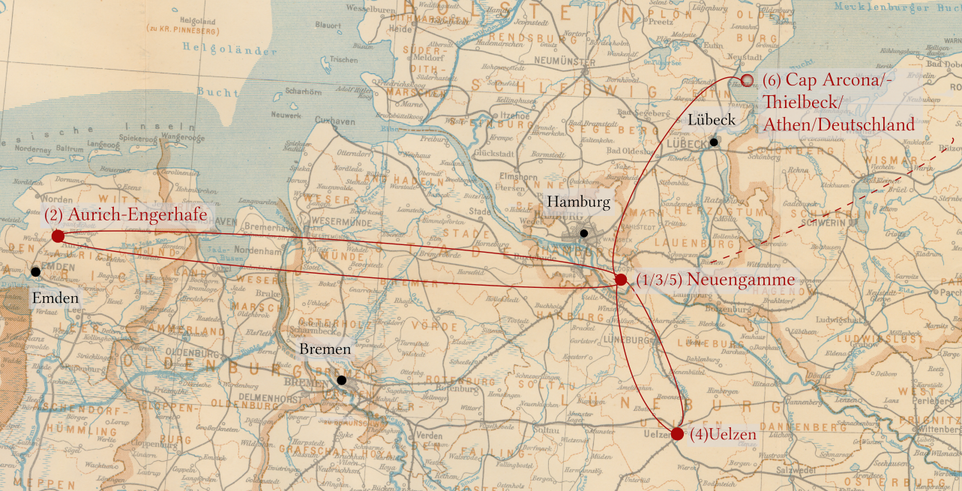Camps in the Reich - Dautmergen, Frommern
Herman Rubinoff, Dautmergen
At the end of the 6 weeks, Kl. and his brother reported for work in Germany in October 1944. Together with a transport of about 1000 Jews, they were sent to the Dautmergen concentration camp near Balingen in Wuerttemberg. They were housed in tents in a swampy area. The food was extremely poor; there was no water and no opportunity to wash. Under these circumstances and constant mistreatment, only about 200 prisoners remained alive. The brothers had to do heavy loading work at the railway station. One day, his brother, with whom he was talking, was beaten to death by an SS man in front of his eyes.
Source: Expert report by D. Pineas, 1969
Efraim Katz, Dautmergen
When I was imprisoned in the Schoenberg forced labour camp, I suffered severe abuse, which resulted in a dislocation of my left shoulder joint.
I was very hungry and wanted to get another portion of food. A sadistic SS man punished me by hanging me up by my hands. I fainted from the pain and after I was taken down, I was still in terrible pain.
terrible pain. A doctor among the prisoners, who helped me put my hands back in place, told me that I had suffered a dislocation.
Of course, I can't remember how long I hung there because I passed out from the pain.
Source: affidavits
When I was imprisoned in the Schoenberg-Dautmergen forced labour camp, I witnessed the claimant Katz Efraim being subjected to ill-treatment. He wanted to take another portion of food and was hung up by the hands of an SS man. I saw him hanging and was driven on.
Source: Testimony of Arie Bendof, 1963
David Shumel, Herman Rubinoff - Frommern
David Shumel is sent to Dachau, Herman Rubinoff is liberated in Frommern.
| Date! event | |
|---|---|
| Spring | 1943 Construction of the oil shale plant in Frommern by LIAS-?lschieferforschungsgesellschaft . Note: LIAS = Black Jura |
| March | 1944 Establishment of the satellite camp of the Natzweiler-Struthof concentration camp, use of concentration camp prisoners |
| Type | of work Construction of the oil slate works; refurbishment work after air raid in Ebingen |
| Deployment | of the prisoners at SS-WVHA, Amtsgruppe W; Deutsche ?lschieferforschungsgesellschaft m.b.H. Remarks: The prisoners were housed in five wooden barracks southeast of Frommern. They were initially deployed in the construction of an oil slate factory on the Hesselberg. Between January and March 1945, 8 deaths were recorded. After that, three prisoners died of decapitation and five from bombing raids |
| 31 October 1944 | 179 prisoners |
| 12/13 April 1945 | 64 prisoners were sent on a "death march" towards Dachau. |
| After | the end of the war, completion by the French occupying forces |
| March | 1947 Start of production |
| Start | 1948 Administration is transferred to the state of W?rttemberg-Hohenzollern |
| November | 1949 Plant is shut down due to unprofitability |
| Source: germany-a-monument.de | |
Neuengamme/Aurich/Uelzen/Cap Arkona
Shlomo und Jakob Charmac
Claimant:
- Jakob Charmac: October 1944, November 1944 to 24 December 1944 Aurich-Engerhafe, December 1944 to March 1945 Neuengamme, March 1945 to 20 April 1945 Uelzen, 20 April 1945 "Kap Arkona"; 1 May 19 45 ship "Athenia", 3. May 1945 liberation
- Shlomo Charmac: October 1944, November 1944 to 24 December 1944 Aurich-Engerhafe, December 1944 to March 1945 Neuengamme, March 1945 to 20 April 1945 Uelzen, 20 April 1945 "Kap Arkona", 1 May 1945 Ship "Athenia", 3 May 1945 Liberation
Links: Gedenkstätte Engerhafe, Gedenkstätte Neuengamme/Außenlager Engerhafe

